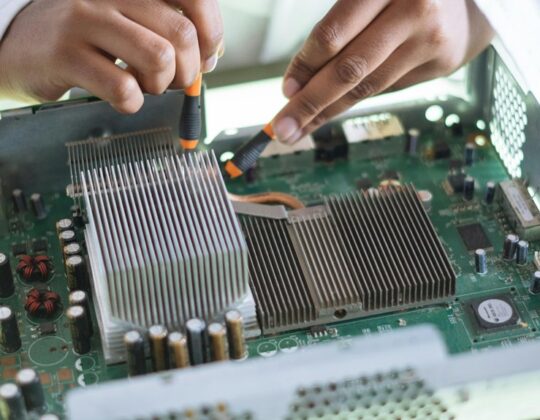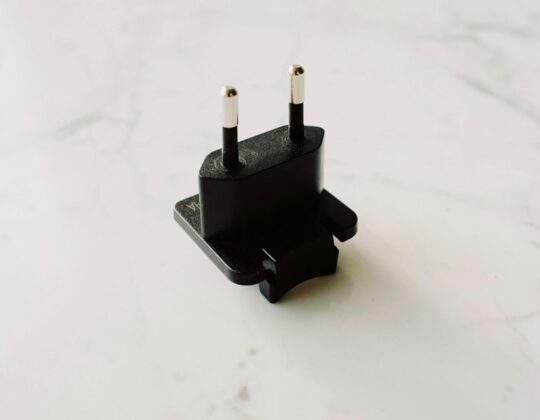Imagine you’re managing a factory that relies on stable and efficient power to run its machinery smoothly. The right AC-DC power converter can transform your facility’s energy usage, optimizing performance and reducing the risk of equipment damage. With components like transformers and rectifiers, these converters guarantee reliable power delivery. You’ll discover how this technology can also support renewable energy integration and lower operational costs. What’s next for AC-DC power conversion in industry?
Understanding AC-DC Power Conversion
AC-DC power conversion is a fundamental process in industrial power systems, transforming alternating current (AC) into direct current (DC) to meet the specific power needs of various equipment. You encounter AC-DC conversion in environments where reliable and efficient power is essential. In industries, many machines and systems rely on DC power for operations, making this conversion important. Understanding this process helps you appreciate how it supports diverse applications, from motor drives to communication systems.
When AC power from the grid enters a facility, it doesn’t always match the requirements of the equipment you use. That’s where AC-DC converters step in, adjusting voltage levels and types. By ensuring consistent power delivery, they enhance system performance and reduce the risk of equipment damage, ensuring peak functionality.
Key Components of AC-DC Power Converters
Now that you’ve grasped the importance of converting alternating current to direct current, let’s explore the key components that make this process possible. First up, the transformer steps up or steps down the AC voltage to the desired level. Next, the rectifier takes center stage, converting AC to DC using diodes or thyristors. After rectification, you’ll find the filter, smoothing out the ripples in the DC output to guarantee a steady flow of electricity. Finally, the regulator controls the voltage and current levels, guaranteeing consistent performance even when input conditions fluctuate. These components work together seamlessly, each playing a critical role in the efficient conversion of power. Understanding them is essential for anyone involved in industrial power systems.
Advantages of Using AC-DC Power Converters in Industry
You’ll find that using AC-DC power converters in industrial settings greatly boosts energy efficiency, helping you save on operational costs. These converters also enhance the longevity of your equipment by providing stable power, reducing wear and tear. Plus, their versatile application range means you can use them across various industrial processes, making them a valuable addition to your power management strategy.
Energy Efficiency Boost
When industries seek to optimize energy usage, integrating AC-DC power converters becomes a game-changer. You’ll notice significant improvements in energy efficiency because these converters reduce energy loss during the conversion process. By transforming alternating current to direct current more effectively, they minimize wasted energy, enabling your operations to use power more judiciously. This efficiency translates to reduced utility costs, making your industrial processes more economical.
Moreover, AC-DC converters support better energy management by providing consistent power delivery. They adapt to varying power demands, ensuring your systems operate smoothly without unnecessary energy expenditure. This adaptability not only cuts costs but also aligns with sustainability goals by reducing the overall carbon footprint. Embracing these converters, you’ll not only save on costs but also contribute to a greener future.
Equipment Longevity Enhancement
Beyond boosting energy efficiency, integrating AC-DC power converters can greatly enhance the longevity of your industrial equipment. By providing a stable and consistent power supply, these converters reduce the stress and wear that fluctuating currents can impose on machinery. When equipment operates under steady conditions, it experiences less overheating and fewer voltage spikes, which are common culprits in premature equipment failure.
You’ll also notice that these converters help in minimizing electrical noise and interference, which can otherwise degrade performance over time. With less strain and fewer disruptions, your machinery runs smoother and maintains its peak functionality longer. This means fewer breakdowns and maintenance calls, ultimately saving you time and money. Invest in AC-DC power converters to guarantee your industrial equipment lasts longer and performs reliably.
Versatile Application Range
AC-DC power converters offer a wide range of applications across various industrial sectors, making them indispensable for modern operations. You’ll find these converters essential in manufacturing, telecommunications, and automotive industries. By efficiently converting alternating current to direct current, they guarantee your equipment operates smoothly, enhancing performance and reliability.
In manufacturing, they power machinery, reducing downtime and boosting productivity. In telecommunications, AC-DC converters support network infrastructure, guaranteeing consistent data flow. The automotive industry relies on them to power electronic components in vehicles, improving functionality and efficiency.
Their adaptability means you can use them in numerous settings, whether you’re running heavy-duty machinery or delicate electronic systems. Embracing AC-DC power converters lets you optimize energy use and maintain operational excellence.
Energy Efficiency and Cost Savings
Although energy efficiency is often a critical factor in industrial operations, implementing an AC-DC power converter can markedly enhance your system’s overall efficiency and lead to substantial cost savings. By converting alternating current (AC) to direct current (DC) with minimal energy loss, these converters optimize power use. You’ll notice reductions in electricity consumption, which directly translates to lower energy bills. Additionally, the decreased strain on your equipment due to efficient power conversion extends the lifespan of your machinery, reducing maintenance and replacement costs. By investing in an AC-DC power converter, you not only improve operational efficiency but also secure a return on investment through energy savings and reduced operational expenses. It’s a strategic move towards a more sustainable and cost-effective industrial setup.
Latest Technological Advancements
As technology rapidly evolves, the latest advancements in AC-DC power converters are setting new standards for industrial applications. You’ll find that modern converters now boast enhanced efficiency and miniaturization. Innovations in semiconductor materials, like silicon carbide (SiC) and gallium nitride (GaN), are driving these improvements, offering reduced energy losses and higher thermal performance. These materials help you achieve greater power density, leading to more compact and lighter devices. In addition, smart features, such as real-time monitoring and adaptive control, are becoming standard, allowing you to optimize performance and anticipate maintenance needs. Furthermore, digital interfaces and advanced software tools are simplifying operation and integration into existing systems. These technological leaps guarantee that you stay ahead in a rapidly changing industrial landscape.
Applications Across Industrial Sectors
In today’s diverse industrial landscape, AC-DC power converters are essential across numerous sectors. You’ll find them powering everything from manufacturing plants to renewable energy systems. In factories, they guarantee smooth operation of machinery by converting AC from the grid to the DC needed for precise control systems. In renewable energy, they’re critical for converting AC from wind turbines into usable DC power for storage and distribution. You’ll also see them in telecommunications, where they power network infrastructure, assuring reliable connectivity. In transportation, they’re fundamental for electric vehicle charging stations, converting AC from the grid to DC to charge batteries efficiently. Across these applications, AC-DC power converters enhance efficiency and reliability, making them indispensable in modern industrial operations.
Future Trends in AC-DC Power Conversion Technology
You’ll notice that future trends in AC-DC power conversion focus on enhanced efficiency techniques, ensuring your systems operate at peak performance. As technology advances, integrating these converters with smart grids will become essential, allowing you to manage energy more intelligently and sustainably. This integration will not only optimize power usage but also support the growing demand for renewable energy sources.
Enhanced Efficiency Techniques
Even though AC-DC power conversion technology has been around for decades, the drive for enhanced efficiency is more relevant than ever. As someone involved in industrial power, you know that improving energy efficiency can greatly cut operational costs. Modern converters use advanced semiconductor materials like gallium nitride (GaN) and silicon carbide (SiC) to reduce energy loss and improve performance. By minimizing heat generation, these materials help you achieve higher efficiency and reliability. You should also focus on optimizing thermal management systems to further enhance performance. Implementing digital control techniques allows for real-time adjustments, boosting efficiency under varying loads. By staying informed about these innovations, you can make smarter decisions, ensuring your power conversion systems are not just efficient, but also future-ready.
Integration With Smart Grids
As the energy landscape evolves, integrating AC-DC power converters with smart grids becomes increasingly vital. You need to guarantee seamless communication between your converters and the grid. This integration enhances energy management, allowing for more efficient distribution and utilization. By adopting smart grid technologies, you can monitor and control energy flow in real-time, reducing losses and optimizing performance.
Smart grids also support renewable energy sources, like solar and wind, by accommodating their variability. With AC-DC converters, you can stabilize power from these sources, securing reliability. In addition, integrating with smart grids enables demand response strategies, where you adjust consumption based on grid conditions, cutting costs and enhancing sustainability. It’s imperative to stay ahead by embracing these advancements, as they’re shaping the future of energy systems.
Conclusion
Imagine a bustling factory floor, where every machine hums in perfect harmony, powered by the unseen magic of AC-DC converters. These devices, like the conductor of an intricate orchestra, transform chaotic AC waves into smooth, reliable DC streams. By optimizing energy flow and embracing cutting-edge technology, AC-DC converters not only slash costs but also pave the way for a greener future. As industries evolve, these converters will remain the backbone, ensuring efficiency and sustainability in every operation.








